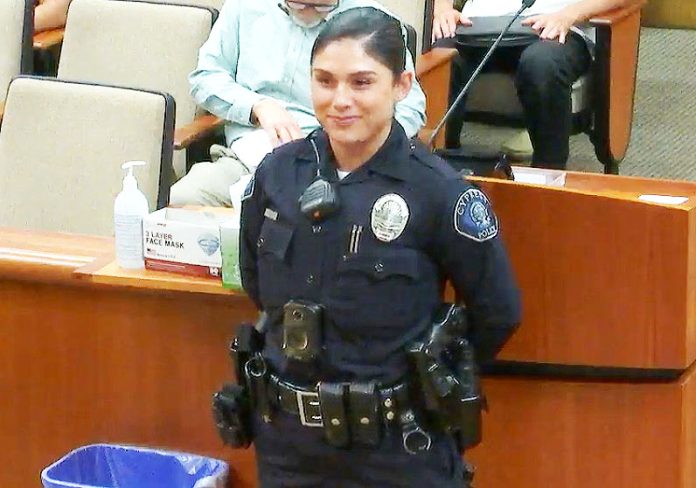
Personnel in the Cypress Police Department are now wearing body-worn cameras, Police Chief Mark Lauderback told the City Council on Monday.
In addition, Lauderback thanked the Cypress Police Foundation for a donation of $49,700 which the police chief said the department will use to install eight automatic license plate readers around the city.
Lauderback thanked the Foundation for “being a great partner to the city,” saying the Cypress Police Foundation’s contribution “will enhance public safety” by adding another layer of security to the mobile license plate readers that currently roll in each of the CPD’a police cruisers.
According to the city’s staff report, the donation will allow the department to go under contract with Insight IT Public Sector Solutions, to license and install the eight cameras, The donated cameras will be provided using a subscription-based model costing $3,000 per camera per year. This cost includes all hardware, software, and connectivity.
“This will complete the project with eight stationary Automated License Plate Readers cameras throughout the city,” the police chief said.
“It will help with investigations, identify vehicles used in crimes and they will be strategically placed throughout the city. A couple of them will be in our business park, which you know, our business park is vital to our city.”
With the business park mostly closed in the evenings and on weekends, “that does unfortunately lead to some criminal activity, or at least an invitation to commit criminal activity,” Lauderback said.
“With these ALPR cameras, we’re going to be able to use them as investigative tools to help identify those who committed the crimes, especially the vehicles, not only in our city, but throughout Orange County and our neighboring cities as well.”
Regarding the body-worn cameras, Lauderback asked an officer to demonstrate what it looks like when officers wear the cameras, and the police chief briefly explained how they work “to capture the interactions with our community, with those suspects or potential suspects we’re investigating.”
“It’s a great tool,” Lauderback told the Council and the department began using it last week.
He said the clarity is “awesome” and Lauderback thanked the city for allowing the department to purchase them.
The mayor also thanked the Cypress Police Foundation.
“We can’t thank the Foundation enough for their support of this department,” said Mayor Scott Minikus.
“I know the body-worn cameras have produced a lot of liability for cities around our nation, but as a whole, it is a great addition to our officers,” he added.
“It helps protect them against unscrupulous internal affairs complaints as well,” the mayor added.. “I t is a great reassurance tool for the officers to wear out there in the field,” the mayor said.
Edwin Kraemer, a Cypress resident who works as a software engineer (including artificial intelligence) for a major aerospace firm, expressed concern that the deployment of surveillance technology by Cypress Police has the potential for misuse.
“I would like to see more focus in the discussion of citizen’s access to that footage and its availability to the public,” said Kraemer during the Council’s oral communications session.
“When you put automated license plate readers in the neighborhoods or anywhere, every car that goes past that thing gets scanned and it can see everyone. You can track a person, you don’t need their social security number, you don’t need their face print, you get the car registration, and you’ll know everywhere that car has been,” he said.
“You will know everywhere that person has been from the time you install that camera until…forever, okay,” said Kraemer.
So what you’re putting in there is the ability to track every U.S. citizen, everywhere they go, easily, and that needs huge controls,” the engineer said, “so I want to hear what we’re doing to assure they are extremely careful with oversight of that because you can track within 100 yards of everywhere.”
“I’m sure it’s great for cops, but over half our budget goes to police. We’re a police state here,” said Kraemer.
Unlike in some other cities, city officials in Cypress do not respond to questions asked by citizens during the oral communications portion of the meeting.
After the meeting, Kraemer said that he did not expect an answer to his concerns, but as an AI engineer, felt he should at least warn citizens of the technology’s potential.
“I’m not for defunding the police,” he said in an interview after the meeting, “but citizens should know that using artificial intelligence coupled, with surveillance technologies, police could potentially have the ability to know not only where your car went, but what you purchased while there.”
Nevertheless, there is no immediate concern that Cypress Police have any plans to misuse the technology, said Kraemer, but “all I can do is ask them to put firm controls in place.”
